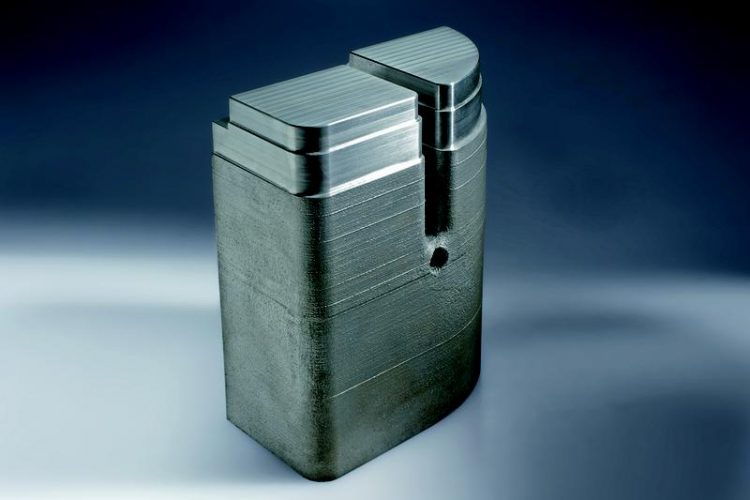Cost-effective manufacturing of large-volume components with combined SLM and casting method

Mold insert, made using the combined method of Selective Laser Melting and casting. Picture Source: Fraunhofer ILT, Aachen, Germany
Injection molding is used to make the majority of plastic components. With additive manufacturing techniques such as SLM, it is possible to integrate complex conformal cooling channels into the tool inserts required for injection molding.
These channels allow the tool mold to be heated up during the injection process, and the melt to cool down quickly and evenly – resulting in rapid, distortion-free manufacturing. However, the manufacture of large-volume tool inserts using SLM is very cost-intensive, because the main production costs are volume-dependent.
To tackle this problem, scientists from Fraunhofer ILT have teamed up with the Foundry Institute at RWTH Aachen University and partners from industry in a bid to combine SLM and casting methods. In the “GenCast” project, which is funded by the German Federal Ministry of Education and Research as part of the Central Innovation Program SME (or “ZIM” in German), the project partners have worked together to build up the requisite process understanding and developed the process chain for the combined method.
Combined method brings down manufacturing costs for tool inserts
The idea behind combining the two methods is to manufacture the shell of the tool insert from hot work steels (1.2343 or 1.2709) using SLM. During this process, cooling channels with complex geometries are still integrated in the exact places where they are needed to heat or cool the component.
The shell built up using this technique serves as a casting mold, which is rapidly and cost-effectively filled with gray cast iron (e.g. GJL-200) or highly thermal conductive copper in a subsequent casting process. This cuts production times by up to 80% compared to components made using SLM alone. The bigger a component is, the more the advantages of this combined method come into play. It can be used cost-effectively from part sizes of only half a liter upward.
Fraunhofer ILT at EuroMold 2014
EuroMold is the world’s leading trade fair for tool and mold construction, design, and product development. This year, the event will be taking place in Frankfurt from November 25 to 28. In Hall 11/C66, Fraunhofer ILT will be unveiling a demonstrator component made using the combined method, a tool core with cross-sectional cooling channels that it will be showcasing to the public for the very first time.
Contact
Dr. Wilhelm Meiners
Head of the Rapid Manufacturing Group
Phone +49 241 8906-301
wilhelm.meiners@ilt.fraunhofer.de
Dr. Konrad Wissenbach
Head of the Competence Area Additive Manufacturing and Functional Layers
Phone +49 241 8906-147
konrad.wissenbach@ilt.fraunhofer.de
Fraunhofer Institute for Laser Technology ILT
Steinbachstraße 15
52074 Aachen, Germany
Weitere Informationen:
Media Contact
All latest news from the category: Trade Fair News
Newest articles

Parallel Paths: Understanding Malaria Resistance in Chimpanzees and Humans
The closest relatives of humans adapt genetically to habitats and infections Survival of the Fittest: Genetic Adaptations Uncovered in Chimpanzees Görlitz, 10.01.2025. Chimpanzees have genetic adaptations that help them survive…

You are What You Eat—Stanford Study Links Fiber to Anti-Cancer Gene Modulation
The Fiber Gap: A Growing Concern in American Diets Fiber is well known to be an important part of a healthy diet, yet less than 10% of Americans eat the minimum recommended…

Trust Your Gut—RNA-Protein Discovery for Better Immunity
HIRI researchers uncover control mechanisms of polysaccharide utilization in Bacteroides thetaiotaomicron. Researchers at the Helmholtz Institute for RNA-based Infection Research (HIRI) and the Julius-Maximilians-Universität (JMU) in Würzburg have identified a…



